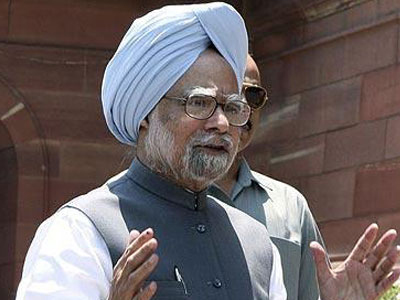
New Delhi, September 15: After unleashing big bang reforms measures in the last two days, Prime Minister Manmohan Singh today said it will take "courage and some risks" to break the policy logjam and strongly favoured higher FDI and FII flows.
Justifying the diesel price hike as an important step in the right direction, he said, rational energy pricing was critical and "our energy prices are out of line with world prices".
In his opening remarks at the full Planning Commission meeting for approving the 12th Plan document, the Prime Minister spoke of three economic scenarios of "strong inclusive growth", "insufficient action" and "policy logjam" and said the country needed close to one trillion dollar investment in infrastructure sector during the period.
"I believe that we can make Scenario I possible. It will take courage and some risks but it should be our endeavour to ensure that it materialises. The country deserves no less," he said.
In big ticket reforms, the Cabinet Committee on Political Affairs on Thursday decided to hike diesel prices and put a cap on supply of subsidised LPG cylinders while yesterday the Cabinet and CCEA cleared FDI in multi-brand retailing and aviation and disinvestment in four PSUs.
Referring to high fiscal deficit and the need to bring it down, the Prime Minister said the 12th Plan projects a current account deficit of 2.9 per cent of GDP.
"This must be financed mainly through Foreign Direct Investment (FDI) and Foreign Institutional Investment (FII) flows so that reliance on external debt is limited. I believe we can attract the financing we need provided out fiscal deficit is seen to be coming under control and the growth momentum is regained",he said.
Singh said, energy is a difficult area where policy needs a comprehensive review. "Rational energy pricing is therefore critical. Our energy prices are out of line with the world prices. The recent increase in diesel price is an important step in the right direction."
The Prime Minister said the central message of the Plan is that the objectives can be achieved provided policies that will take care of weaknesses put in place. For the first time the Plan introduces three alternative scenarios.
Under Scenario I called "strong inclusive growth" one can expect a number of virtuous cycles to start operating leading to positive results on both growth and inclusion. "This is the scenario we should aim for".
Scenario II, called "insufficient action", describes state of partial action with weak implementation. In this scenario, the virtuous cycles that reinforce growth in Scenario I, will not kick in, and growth can easily slow down to 6 to 6.5 per cent.
Singh said inclusiveness will also suffer. "This is where we will end up if we make only half-hearted efforts and slip in implementation. It is my sincere hope that we do not do so."
Calling Scenario III as "policy logjam", he said it reflects a situation where for one reason or another most of the policies needed to achieve Scenario I are not taken.
"If this continues for any length of time, vicious cycles begin to set in and growth could easily collapse to about 5 per cent per year, with very poor outcomes on inclusion.
"I urge everyone interested in the country's future to understand fully the implications of this scenario. They will quickly come to an agreement that the people of India deserve better than this," Singh said.
Referring to global economic issues, Prime Minister said, "these short term problems present a challenge, but they should not lead to undue pessimism about our medium term prospects.
"The economy has gained many strengths. Our immediate priority must be to orchestrate a rebound in the second half of the current year. We should then try to accelerate growth to reach around 9 percent by the end of the Plan period," he added.
The 12th Plan (2012-17) is proposing an annual average growth rate of 8.2 per cent, which is lower than the earlier estimate of 9 per cent. The economy recorded a growth rate of 7.9 per cent in the 11th Plan.
According to the Prime Minister, the 11th Plan growth rate was commendable, "for a period which saw two global crises – one in 2008 and another in 2011".
Singh further said that poverty declined twice as fast between financial years 2004-05 and 2009-10 than it did in the previous ten years, while agriculture grew at 3.3 percent per year in the 11th Plan, much faster than the 2.4 percent observed in the 10th Plan.
As regards the growth prospects in the 12th Plan, Singh said, "we must also recognise that the 12th Plan is starting in a year when the world economy is experiencing difficulties and our economy has also slowed down".
Referring to scaling down of the target in the 12th Plan from the original estimate of 9 per cent to 8.2 per cent, he said, "some downward revision is realistic given the state of the world".






Comments
Add new comment